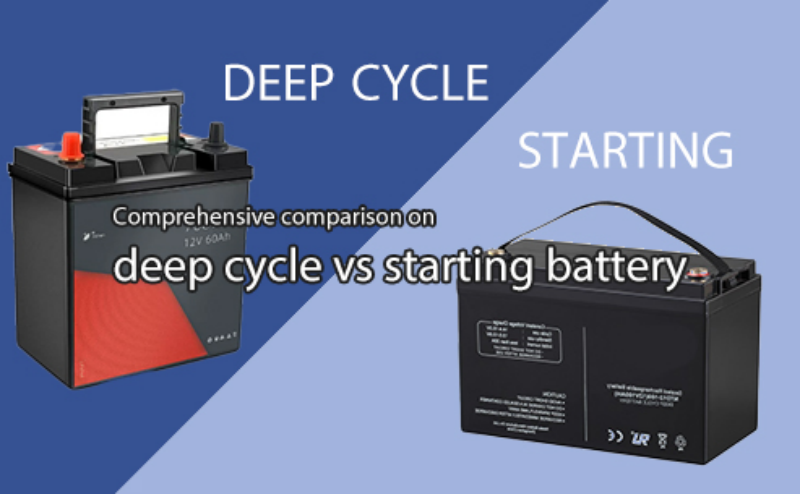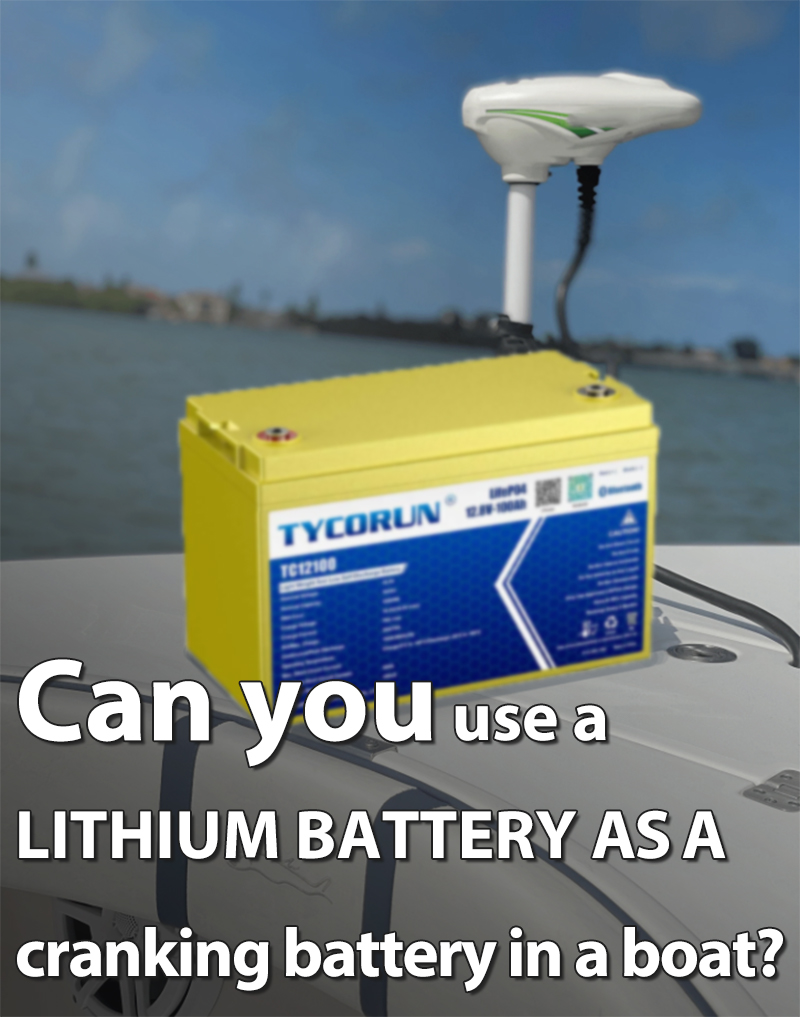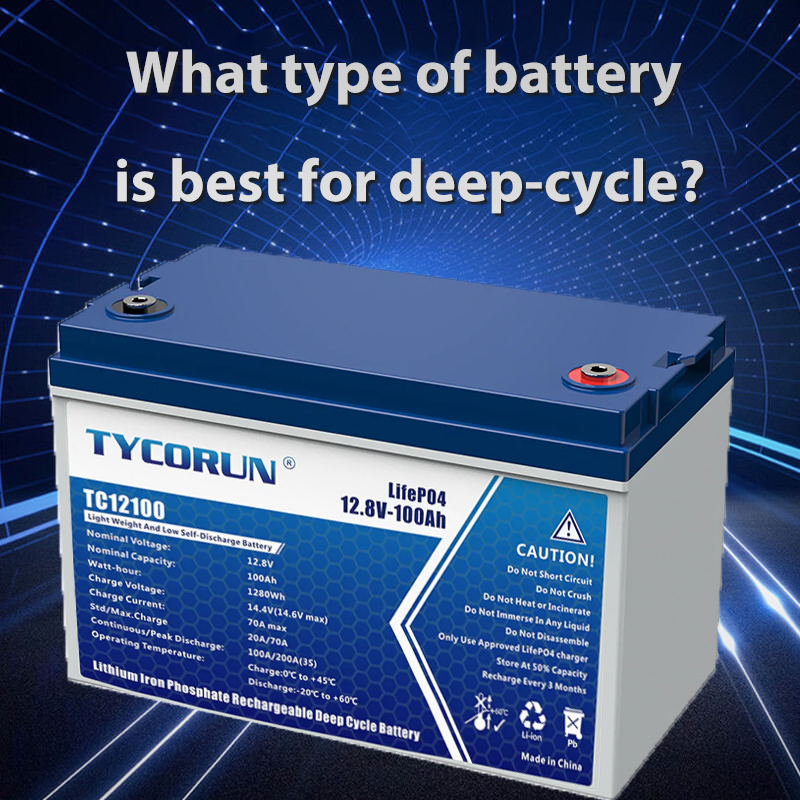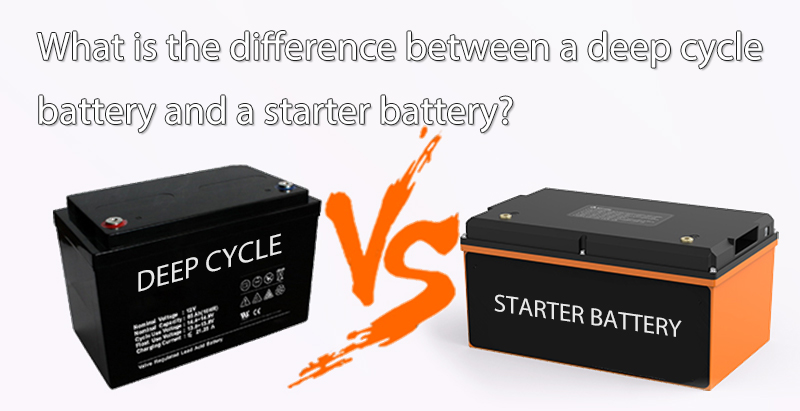
Main content:
- What is a starting deep cycle battery?
- Is there a lithium starting battery? Can you use a lithium deep cycle battery as a starter battery?
- Can you use a lithium battery as a cranking battery in a boat?
- Do you need to charge a starting battery?How to charge your starter battery?
- When should you use a deep cycle battery?
- What type of battery is best for deep cycle?
- How long can deep cycle batteries last without charging?
- What is the difference between a deep cycle vs starting batteries?
- Summary
Having a battery that meets your demands and is economically efficient at the same time is important. As such, your application requirements will determine whether you’ll require a starting battery or a deep cycle battery. This article is designed to help you understand everything to do with the deep cycle vs starting battery. You are going to learn:
- What is a starting battery and how it function
- What is a deep cycle battery and how it function
- The differences between the two batteries as well as their application
- How to select the best starting or deep cycle battery
- The deep cycle lithium ion battery is the most ideal choice among deep-cycle batteries.
Let’s get started!
1.What is a starting deep cycle battery?
Deep cycle battery and starting battery are two types of batteries with different functions. Although there are dual purpose batteries that combine the two functions on the market, people rarely call them starting deep cycle batteries. Deep cycle battery plates have thicker active plates with higher density active slurries and thicker separators. Alloys used for deep cycle battery plates may contain more antimony than starter batteries. It is also important to note that starting batteries have more cranking amps compared to deep cycle batteries. Most starting batteries have a voltage of 12V.
2.Is there a lithium starting battery? Can you use a lithium deep cycle battery as a starter battery?
Yes, lithium starting batteries are available for purchase.However, it should be noted that these are not start-up lithium batteries in the full sense. They are all used in automobile engines, and the required starting current is small, and they are generally not used for cold start. They are light-duty applications. Many protection functions are not incomplete. As for the general-purpose starting lithium battery, it is rarely seen at present.
Lithium batteries are not recommended as starting batteries. As a starting battery, the instantaneous discharge current is required to be large, and the short-circuit current can reach hundreds of amperes, but it cannot be deeply discharged and continuously discharged for a long time. The lithium battery can last for a long time to discharge, but can only provide a small starting current, it usually used as a battery for energy storage. Therefore, it is better not to use a lithium deep cycle battery as a starter battery.
3.Can you use a lithium battery as a cranking battery in a boat?

You can't use a lithium battery as a starter battery on a boat. Currently, most starter batteries are still lead-acid batteries with a higher cranking current. However, power lithium-ion batteries have accumulated relevant experience in the application of electric vehicles, grid energy storage, unmanned system mobile platforms and other fields. On the basis of these applications, large-capacity lithium-ion batteries are widely used in the field of electric boats as marine batteries, and their energy storage technology solves many problems in the power drive of boats.
4.Do you need to charge a starting battery?How to charge your starter battery?
Yes, when the car is running, it will replenish the battery through the generator, but when the battery is seriously depleted, it needs to be replenished in time. The charging capacity of the car itself is not enough. It needs to be connected to a portable charger to charge the starting battery, which takes 20 hours to charge. Starting batteries do not require a special charger - you can use a lead-acid battery charger. However, it would be best to avoid using a lead-acid battery charger with an automatic equalization mode that cannot be switched off.
5.When should you use a deep cycle battery?
Deep Cycle Lithium batteries are the batteries with a very high number of cycles, they have a long life if properly maintained. Deep cycle batteries are used to power auxiliary devices in either a car or a boat for longer durations without cranking the engine. It, therefore, means that deep cycle batteries are super strong. Deep cycle batteries should be used when you want to power devices for longer durations. It is important to note that lead acid batteries also have deep cycle batteries and they cannot be discharged too much. Similarly, Li-ion batteries can be discharged to 80-100%, but it is still not recommended to do so often.
You’ll find out that most deep cycle batteries are used in:
- Marine application
- RVs
- Lifting machines, for example, forklifts, etc.
- Off-grid power storage
- Energy storage
6.What type of battery is best for deep cycle?

Lithium batteries are best for deep cycles. There are lots of benefits associated with using lithium deep cycle batteries:
- Higher energy density- Lithium deep cycle batteries have a higher energy density compared to other deep cycle batteries. High energy density means that the battery is super-light and that it has a lot of power compared to other battery types.
- Performance- Their performance is also outstanding. A deep cycle lithium battery can quickly discharge and recharge whenever needed, meaning that downtime is significantly reduced.
- Lifespan- a deep cycle lithium battery can last up to 4,000 charging cycles if properly handled. That is 5-8 times more than a lead-acid deep cycle battery which can only last up to 500-800 charging cycles.
- Versatility- Deep cycle lithium batteries can be used in an array of applications. They are versatile - meaning that they can handle many devices from marine applications (which is brutal), RVs, materials handling (in forklifts and other heavy machines), etc.
- Safety- Deep cycle lithium batteries are safer than lead-acid deep cycle batteries. They are completely sealed, meaning that foreign materials cannot enter the battery. On top of that, lithium batteries have a cut-off protection technology that prevents overcharging and over-discharging.
7.How long can deep cycle batteries last without charging?
Deep cycle batteries are designed to last for longer durations after a single recharge compared to other battery types. However, the duration a deep cycle battery can last after a single charge depends on the battery’s amp hour rating as well as the load the battery needs to power.
8.What is the difference between a deep cycle vs starting batteries?
There are three primary differences between deep cycle vs starting batteries:
- Starter batteries are primarily used to start your car’s or boat’s engine while a deep cycle battery canpower your car’s or boat’s auxiliary devices for longer durations without needing a running engine.
- Starting batteries have thinner internal plates for low resistance compared to deep cycle batteries which have thicker internal plates for deep cycling abilities.
- Starting batteries have a lower depth of discharge compared to deep cycle batteries which can cycle up to 4000 times.

9.Summary
Selecting the ideal battery depends on your needs - how do you use your battery? Do you use it for cranking engines only or do you also need something that will power your devices such as the navigation, sound system, power tool, UPS, etc. There are three primary differences between a deep cycle vs starting battery: their applications, internal structure, and performance. Starting batteries are primarily used to crank engines, while deep cycle batteries can power devices for longer durations.
Deep cycle batteries have thicker internal plates for deep cycling while starting batteries have thinner plates designed for lesser resistance during discharging. Lithium batteries are ideal for deep cycle, they have a higher energy density and longer cycle life, perform better, are more versatile. Regardless of whether you want to storage energy for your equipment or power your devices, best lithium batteries are the optimal battery choice for you.